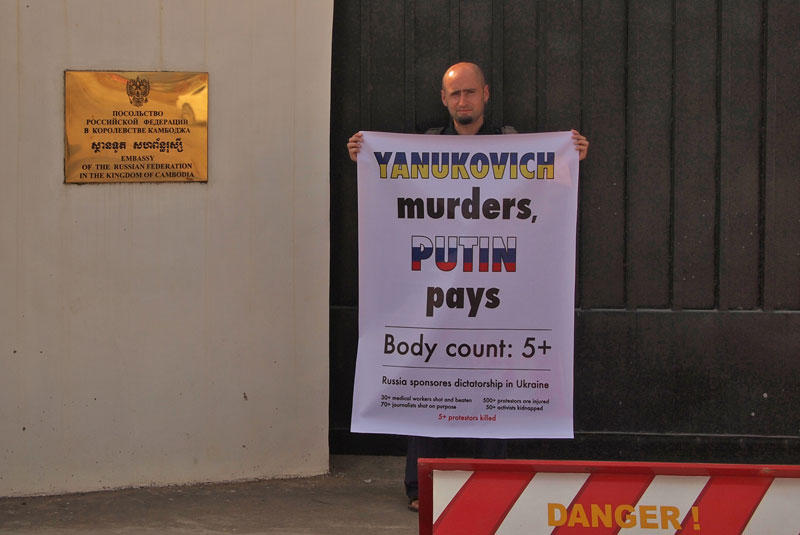Andrei Sidorkin cut a lonely figure as he unfurled his banner outside the Russian Embassy in Phnom Penh on Sunday and squinted into the sun to survey the empty cul-de-sac where National Assembly Street reaches its dead end.

One-person protests have throughout history created powerful symbols of resistance, such as Rosa Parks’ 1955 bus ride in Montgomery, Alabama, in defiance of segregation laws, or the anonymous Tank Man in Beijing’s Tiananmen Square in 1989.
But as two Cambodian security guards watched from outside the Russian Embassy with hands cupped into visors to screen the glare of afternoon sun, both curious and indifferent, it was clear that Mr. Sidorkin was not threatening anything so dramatic.
“I think it is just you and me,” the 32-year-old Russian tourist said quietly to a reporter, before explaining that the reason for the one-man demonstration was to protest the brutal repression of peaceful protests by the Russia-backed authorities in Ukraine’s capital, Kiev, where he lives.
“It may be microscopic, but I want to present a human face and show people back home that I am with them, even if I am not there,” he explained.
Originally from St. Petersburg, Mr. Sidorkin moved to Kiev about 10 years ago for love, but when that relationship ended he decided to stay there, where he has worked various jobs including as a magazine editor, and in TV production.
On Sunday, he was taking a time out from the usual backpacking tourist routines to hold his demonstration at the Russian Embassy in a show of solidarity with his adopted countrymen and women.
“I am here to protest the passing of anti-democratic laws in parliament without the proper procedures, and the authorities’ enactment of laws that limit the freedoms of peaceful gatherings that puts the government outside of the Constitution and of the law,” he said, the relative silence at the back-entrance of the embassy in Phnom Penh rendering his protest more of a one-man-picket show.
Mr. Sidorkin’s picket may have been about the ongoing political unrest engulfing Kiev, but his diatribe against Moscow could have easily been mistaken for a commentary on the situation that day in Phnom Penh.
Across town, in Freedom Park, Daun Penh district security guards were exchanging bricks and administering baton blows with a few dozen demonstrators who turned out for a peaceful rally, in spite of what many believe is an unconstitutional ban on public gatherings by the government here, to protest the continuing detention of 23 men arrested during recent strike protests.
The strike protests only ended after military police killed five people and wounded at least 40 more.
“Wow, this protesting is happening here, today?” Mr. Sidorkin asked.
“I heard something about this so far, though I don’t really know about it. My protest is not for the locals [in Cambodia], it is for the people of Ukraine—but the parallels are strong, I think.” he said.
The banner, which he had specially made at a printing shop near his guesthouse, condemns Ukraine’s President Viktor Yanukovich for the murder of at least five protestors during the increasingly violent anti-government demonstrations, and accuses Russian President Vladimir Putin of bankrolling Yanukovich’s “dictatorship.”
“The shopkeeper asked me if I was afraid [to protest] and I thought that it’s just horrible. When politicians can intimidate us so much that we feel scared for even little insignificant private expressions we make.”
Mr. Sidorkin admitted he did not fully understand the situation in Cambodia and says the situation in Kiev is equally complex and easily misunderstood by outsiders not tuned to the evolution of the protests since they began in late November.
“Every protest movement should be considered separately,” he said.
Initially, protests in Kiev were a response to the Ukraine government’s abrupt volte-face on a trade deal with the European Union that was supported by the majority of the population, in favor of a deal with Russia that offered a quick $15 billion cash bail-out for a near-bankrupt economy without requiring reforms.
The demonstrations in Kiev grew, in part, as a result of the government’s violent suppression of those protests, but also because of a general weariness with perceived corruption in the government, and its pro-Moscow tendencies.
They have now grown into an anti-government movement comprising disparate political groups seeking a common goal of new elections and for President Yanukovich to step down.
“What is common in all protest movements is that ordinary people begin to realize themselves as subjects of politics, which means that they then stop being its objects,” Mr. Sidorkin said.
“Then, they have created a completely new reality…and they show that the performance of politics is not owned by authority alone and is not the exclusive privilege of the powerful.”